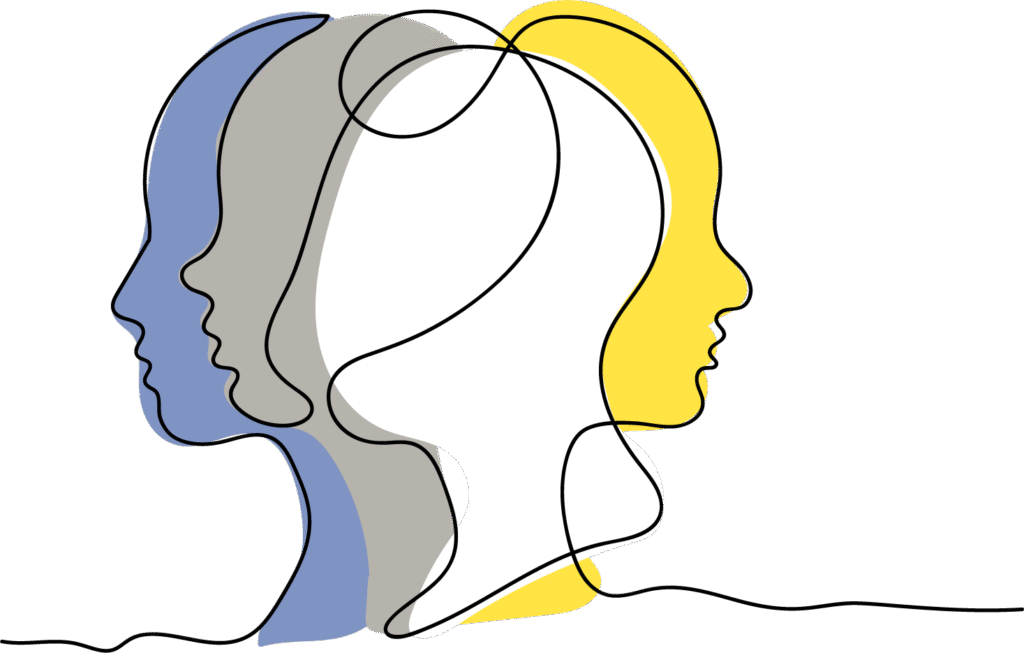Anorexia – intense fear of gaining weight, severe food restriction, or over-exercising
Bulimia – cycles of binge eating followed by purging, fasting, or excessive exercise
Binge Eating – repeated episodes of eating large amounts of food, often in secret or with feelings of shame
ARFID (Avoidant/Restrictive Food Intake Disorder) – strong avoidance of certain foods or difficulty meeting nutritional needs
Other eating concerns – struggles with food or body image that don’t fit neatly into one category
Eating Disorders
What are Eating Disorders?
Eating disorders are not just about food. They are serious mental health challenges that can impact your physical, emotional, and social wellbeing. In Canada, they affect nearly one million people—and they can happen to anyone.
Some of the most common eating disorders include:

It’s a misconception that eating disorders only affect young women or people in smaller bodies. In reality, they affect people of all genders, backgrounds, and body sizes.
If food, eating, or body image feels like it’s taking up too much space in your daily life, it may be time to reach out for support.
If you think you may be suffering from disordered eating or may have an eating disorder, please take this quick survey.
Our approach to recovery
Recovery is possible. At Sööma, we use a team approach so that you feel supported at every step.
How a Therapist Helps
Our psychologists and psychotherapists use proven methods for treating eating disorders and co-occurring problems like:
Cognitive Behavioural Therapy (CBT)
Family-Based Therapy (FBT)
Acceptance and Commitment Therapy (ACT)
Dialectical Behaviour Therapy (DBT) for bulimia and binge eating
Your therapist will help you understand the role of your eating disorder, explore what’s driving it, and build healthier coping strategies for lasting change.
How a Dietitian Helps
Our registered dietitians support you in repairing your relationship with food. They provide:
Nutritional stabilization and recovery support – this is essential for all types of bodies. Contrary to common belief, even individuals in larger bodies can be malnourished or physically unstable.
Gentle guidance on balanced eating without rigid rules
Help navigating food fears and exposures
A compassionate, weight-inclusive approach
At Sööma, dietitians don’t promote restrictive diets. Instead, they help you learn how to nourish your body and explore what recovery and normal eating may look like at your own pace. Dietitians will always consider any medical conditions that may influence your dietary needs.
Why Medical Support Matters
Because eating disorders can carry serious health risks—like heart irregularities, fainting, bone loss, or electrolyte imbalances—we encourage all clients to stay connected with their family doctor for ongoing medical monitoring.
Why Choose Sööma
Specialized expertise in eating disorders
Our therapists and dietitians have extensive training and experience in treating eating disorders and disordered eating patterns.
Compassionate, judgment-free care
We welcome you with respect and empathy—no matter your story, your body size, or your current relationship with food.
Collaborative care
Our approach brings together psychologists, psychotherapists, dietitians, and doctors to provide comprehensive, personalized support.
Flexible options
You can access our services in person in Montreal or virtually, wherever you are in Quebec.
At Sööma, our mission is to guide you toward lasting wellbeing with compassion, expertise, and hope.
Eating Disorders and Trauma-Informed Care
Many people who struggle with eating disorders have also experienced trauma. Trauma can shape the way someone thinks, feels, and relates to others. In many cases, an eating disorder may have developed as a way to cope or to feel safe in overwhelming or unsafe environments.
At Sööma, we use a trauma-informed approach. This means we see the eating disorder not just as a problem to “fix,” but as a survival strategy that once helped you get through difficult experiences. Our goal is to honor that history while supporting you in building healthier, more sustainable ways of coping.
What Trauma-Informed Care Means
Trauma-informed care is about compassion, respect, and empowerment. It includes:
- Non pathologizing - asks “What is your experience” vs. “What is wrong with you”
- Supporting and accompanying people as they heal
- Awareness of triggers – recognizing how past trauma can be stirred up by present-day experiences
- Validation – helping you feel valued for who you are, not judged for your struggles
- Respect for your wisdom – trusting that you have inner strength and insight into what is best for you
- Centering your lived experience – ensuring your voice guides the care you receive, rather than only the professional’s opinion

This approach helps you feel seen, safe, and supported while addressing both the eating disorder and its deeper roots.
Eating Disorders and Disordered Eating
You don’t need an official diagnosis to be struggling with food. Disordered eating patterns are very common, often fueled by diet culture and unrealistic body ideals. Restrictive eating, binge eating, or constant weight cycling can all harm your physical and emotional health.
If you find that your self-worth feels tied to your body shape, weight, or food choices, you may have a disordered relationship with food. Support is available, and you deserve care that helps you rebuild a healthy, compassionate connection with eating and with yourself.

